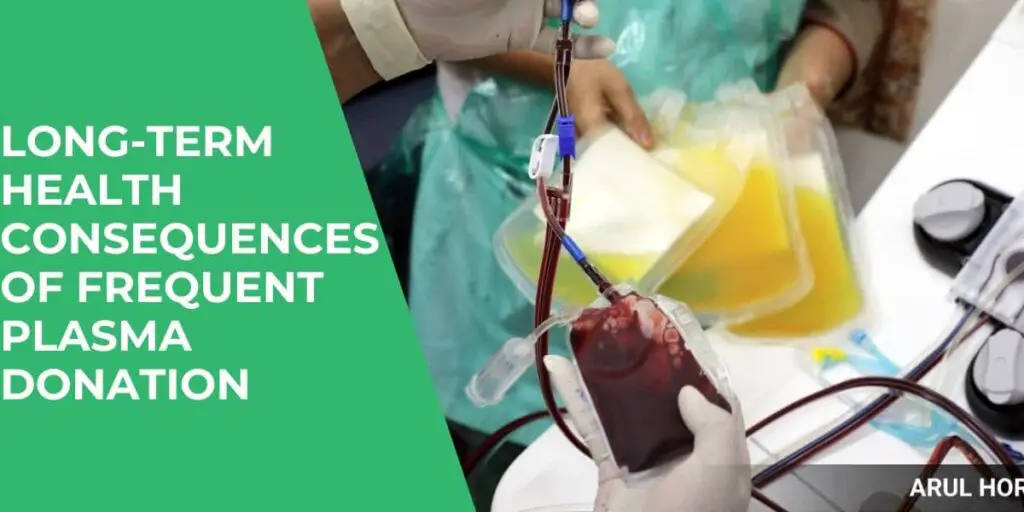
You wouldn’t believe it—I almost fainted while donating plasma the other day!
As much as I’m all for saving lives and earning some extra cash, I couldn’t help but wonder: what are the risks of donating plasma?
So in this article, we discuss the health Risks of Donating Plasma and its side effects that may cause problems.
Top 10 Risks of Donating Plasma
These are the top 10 risks of donating plasma:
- Infection
- Bruising
- Dehydration
- Fatigue
- Low blood pressure
- Allergic reactions
- Nerve damage
- Iron depletion
- Blood clotting
- Adverse reactions to medication
1. Infection
Infection risk is associated with any medical procedure, and plasma donation is no exception. This risk can be minimized by ensuring that all equipment is sterile and that the donation center follows proper hygiene protocols.
2. Bruising
It is common to experience bruising at the needle insertion site after donating plasma. This risk can be minimized by correctly inserting the needle and avoiding strenuous activities for a few hours after donation.
Read my article Does Donating Plasma Leave Scars? to learn how you can prevent getting scars from plasma donation.
3. Dehydration
Donating plasma can cause dehydration, leading to dizziness and weakness. Drinking fluids before and after a donation is essential to minimize this risk.
4. Fatigue
Donating plasma can cause fatigue and exhaustion, especially if you donate frequently. It is important to rest and take care of yourself after donation.
5. Low Blood Pressure
Plasma donation can cause a drop in blood pressure. To reduce this risk, stay hydrated and avoid standing up immediately after a donation.
6. Allergic Reactions
People experience mild to severe allergic reactions after donating plasma. This is caused by the anticoagulant used during plasma donation. You must inform the donation center if you have any known allergies.
7. Nerve Damage
Plasma donation can cause nerve damage, leading to numbness or weakness. This can be minimized by ensuring the needle is inserted correctly before donating. Also, inform the donation center if you have any pre-existing nerve conditions.
Check out this post if you are wondering Why Do They Check Your Elbows When Donating Plasma.
8. Iron Depletion
Regular plasma donations can lead to iron depletion. This can cause anemia and other health issues. Ensure your diet is iron-rich, and limit plasma donation to twice a week.
9. Blood Clotting
Plasma donation can cause blood clotting, leading to health issues. Always inform the donation center if you have a history of blood clotting disorders.
10. Reactions to Medication
Some medications can interact with plasma donation, leading to reactions. It is essential to inform the donation center if you are on medication. Also, follow their guidelines regarding medication use before and after donation.
Why You Should Not Donate Plasma?

You shouldn’t donate plasma because of health issues like fainting, low blood pressure, or allergic reactions. Also, people with medical conditions or taking medications are not to donate plasma. Always consult with your healthcare provider and the donation center before donating.
If you are a regular donor, check out this article on whether is it safe to donate plasma twice a week.
Short Term Side Effects and Health Complications
These are the short term side effects and health complications of donating plasma:
- Dehydration: Donating plasma can cause dehydration, dizziness, and weakness.
- Fatigue: Donating plasma can cause fatigue and exhaustion, especially if you frequently donate.
- Bruising: It is common to experience bruising at the needle insertion site after donating plasma.
- Low blood pressure: Plasma donation can reduce blood pressure, causing dizziness and fainting.
- Allergic reactions: Some people may experience allergic reactions during plasma donation.
- Nerve damage: In rare cases, plasma donation can cause nerve damage. This can lead to a donor being numb, tingly, or weak.
- Blood clotting: Donating can cause blood clotting, leading to serious health issues.
Discover How Many Times Can You Donate Plasma in One Month?
Long Term Health Consequences of Frequent Plasma Donation

Some long term health consequences of frequent plasma donation are:
- Iron deficiency: Frequent plasma donation can lead to iron deficiency. This is because each donation removes significant iron from the body.
- Protein depletion: Plasma contains proteins for maintaining the body’s immune system and other functions. Regular plasma donation can deplete these proteins and weaken the immune system.
- Scarring at the donation site: Repeated needle insertions can cause scarring and damage to the veins. These scars can make it to donate plasma in the future.
- Infections: Although donation centers follow strict guidelines to prevent infections, there is still a risk of contracting infections. These infections include HIV, hepatitis B and C, and others from the donation process.
- Dehydration: Frequent plasma donation can lead to chronic dehydration. This can later lead to health issues such as kidney problems.
- Cardiovascular disease: Evidence suggests that donating plasma frequently can lead to cardiovascular disease.
- Reactions: Exposure to anticoagulants during plasma donation can cause the body to react negatively.
Read my post on Does Donating Plasma Affect Muscle Growth? to discover how you can balance plasma donation with your muscle growth.
Psychological and Emotional Plasma Donation Risks
The psychological and emotional implications of donating plasma include:
- Anxiety: The donation process can be anxiety-provoking for some individuals. Their anxiety can increase if they fear needles or medical procedures.
- Guilt or shame: Some people may feel guilty or ashamed about donating plasma. This guilt can worsen if they do it for financial reasons rather than selflessness.
- Fatigue: Donating plasma can be physically draining, which can lead to feelings of exhaustion and low mood.
- Social isolation: Donating plasma can be time-consuming. This can interfere with social activities and lead to feelings of isolation.
- Burnout: When a person donates plasma frequently, it can lead to burnout. Frequent donation mostly occurs when an individual donates plasma for financial reasons and feels compelled to donate despite feeling tired or unwell.
- Post-donation reactions: Some individuals may experience physical symptoms such as dizziness or fainting after donating plasma, leading to anxiety or distress.
- Trauma triggers: The donation process may be triggering for individuals with a history of trauma, particularly if it involves medical procedures or needles.
Frequently Asked Questions on Risks of Donating Plasma
Here are the frequently asked questions on the Risks of Donating Plasma:
Can donating plasma cause problems?
Donating plasma can cause problems, like dizziness, fainting, and dehydration.
Is donating plasma safe?
Donating plasma is generally safe for most healthy individuals.
Can I donate plasma while pregnant?
Pregnant women are not eligible to donate plasma.
Does plasma donation have a long-term effect?
Regular plasma donation can have long-term effects on the body.
Does donating plasma cause muscle cramps?
It is possible to experience muscle cramps after donating plasma, particularly if you become dehydrated.
Can donating plasma frequently have long-term health consequences?
Regular plasma donation can have long-term health consequences.
Conclusion
Donating plasma helps contribute to the medical community and helps those in need. Knowing the risks of donating plasma and why you shouldn’t donate plasma is important.
After plasma donation, short-term complications like bruising, lightheadedness, and dehydration can occur.
Also, frequent donations can lead to long-term health consequences. Discussing your medical history and concerns with the staff before plasma donation is crucial.
Furthermore, prioritize proper self-care and hydration before and after the process. You can minimize the risk of donating plasma by staying informed and taking necessary precautions.

